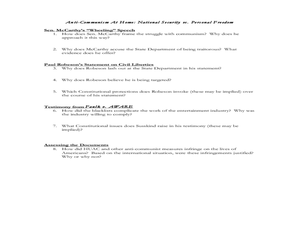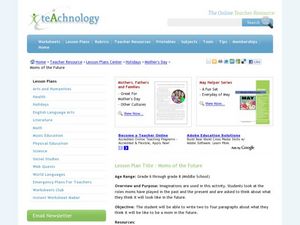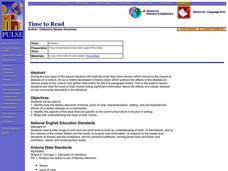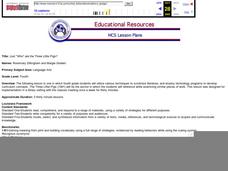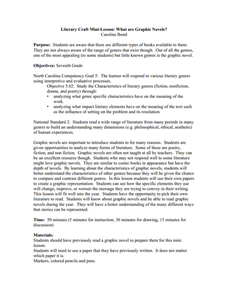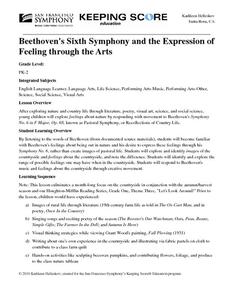Curated OER
Historical Fiction: A Wealth of Interpretations
Students read a book from the Dear America series and contrast different points of view. They respond to the book either by participating in a literature circle or completing a journal entry. They compare and contrast two books or a...
Curated OER
Timmy's Christmas Presents
Students build their reading comprehension skills. In this short story lesson, students read "Timmy's Christmas Presents" and respond to short answer questions regarding the story.
Curated OER
The Cold War: Anti-Communism at Home
Eleventh graders take a closer look at the Red Scare. In this Cold War instructional activity, 11th graders read the provided literature about anti-communism in the United States and then respond to the provided discussion questions that...
Curated OER
Moms of the Future
Middle schoolers explore the roles of mothers. In this writing skills lesson, students discuss what motherhood will look like in the future and what it looked like in the past. Middle schoolers respond to a writing prompt that requires...
Curated OER
Interative History Notebook Mini-lesson
Students respond to Holocaust literature. In this interactive history instructional activity, students select quotes from chapter 1 of Elie Wiesel's Night and reflect on their meaning as they record their thoughts on poetic, prose,...
Curated OER
Apply Post-Reading Skills and Discuss Persuasive Text
Students put their reading comprehension skills to practice. In this interpreting text lesson, students read "Chief Red Jacket's Reply," and then respond to questions that require them to reason, infer, and analyze the selection.
Curated OER
My Diary From Here To There: Understanding Mexican Culture Through Research and Diary Entries
Third graders explore the adventures of an immigrant as she comes to the United States. They discuss the difficulties the immigrants had and they research the Mexican culture and society. Students create a diary of their own.
Curated OER
Oops, I Did Not Say it Right
Your little learners listen to the story Chicken Little in order to explain how behavior affects interpersonal communication. They engage in a class discussion to determine the differences between truth and gossip.
Curated OER
Bright Mice
Kindergarten through second graders explore the long i sound. In this phonics instructional activity, they read The Mother's Day Mice, sing "Farmer in the Dell," and play I Spy with long i in order to explore the target sound....
Curated OER
Time to Read
High schoolers identify how the literary elements of theme, point of view, characterization, setting, and plot illustrate the effects of a certain disease on a community. They identify the aspects of the book that are specific to the...
Curated OER
Just "Who" are the Three Little Pigs?
Fourth graders use a Venn diagram to compare and contrast various versions of the story The Three Little Pigs. They write a Cinquain, and then act out their version of the Three Little Pigs in a skit.
Curated OER
The 3 Little Pigs
Second graders create new endings to The Three Little Pigs. They read and discuss The True Story of the Three Little Pigs and compare it to the original version. After comparing the two versions, they write a friendly letter to the wolf...
Curated OER
Harry the Dirty Dog
Students investigate the parts of a book by reading a story about a dog. In this reading comprehension lesson plan, students utilize their memory to place pictures from the book Harry the Dirty Dog in order from start to finish....
Curated OER
Identifying Character Traits Worksheet
In this character traits worksheet, students respond to a literature book of their own by filling out a chart. Students list actions and the character traits they reveal.
Curated OER
The Call of the Wild
Students work with educational software based on literature selections that introduce them to exemplary works of fiction. They read the novel and use the software to respond to different levels of questions. They design creative...
Curated OER
Strega Nona Lesson Plan
Students explore story characters as well as cause and effect. In this Strega Nona lesson plan, students read a wide range of print and non-print texts to build an understanding of texts, of themselves, and of the cultures of the United...
Curated OER
Alternative Ideas for Book Reporting in Primary Grades
Looking for a new way to have your students complete book reports? Then, this lesson is for you! Young learners read literature of their choice and complete diorama, filmstrip maker, costume and letter, or puppet making activities...
Appalachian State University
What Are Graphic Novels?
To do this engaging and pleasurable activity, your learners should have already read a graphic novel, and produced a piece of writing that can be reproduced into the format of a graphic novel. This exercise provides a script that...
Curated OER
Irony in Poetry and Prose (Fiction and Non-fiction Texts)
Middle and high schoolers examine the impact of irony in poetry and prose. In this figurative language lesson plan, they read instructor-selected literature and identify uses of irony. Then they discuss how irony enhances literature.
San Francisco Symphony
Beethoven's Sixth Symphony and the Expression of Feeling through the Arts
Here is an activity used originally to finish off a unit on country life and nature. It requires learners to have a basic understanding of harvest, rural life, and autumn. They'll use what they know to construct dance movements showing...
Curated OER
Literary Analysis of Theme
Remember reading "The Lottery" and "The Possibility of Evil" by Shirley Jackson? Learners can experience and analyze the tension, themes, and human experience found in these pieces through reading and class discussion. They use...
Curated OER
How Do You Know?
What is the difference between primary and secondary sources? Help your middle schoolers develop a knowledge of appropriate sources to use when doing accurate research. They develop unique ways to incorporate literature in historical...
Curated OER
Social Class, Social Change, and Poverty
Students demonstrate how sociological research and literature can add to our understanding of poverty. They explore poverty and its implications on society and future organizations.
Appalachian State University
Making Your Point Using Dialect
Explore the sounds, importance, and effectiveness of dialect in literature. Active participants read, listen to poetry, and explore dialect by developing a formal definition, discuss the benefits of its use, complete a Venn diagram...
Other popular searches
- Response to Literature
- Response to Literature Essay
- Theme Response to Literature
- Response to Literature Genre
- Responses to Literature
- A Response to Literature
- Avid Response to Literature
- Free Response to Literature
- Writing Response to Literature
- Literature Responses
- Night Responses to Literature
- Short Response to Literature


